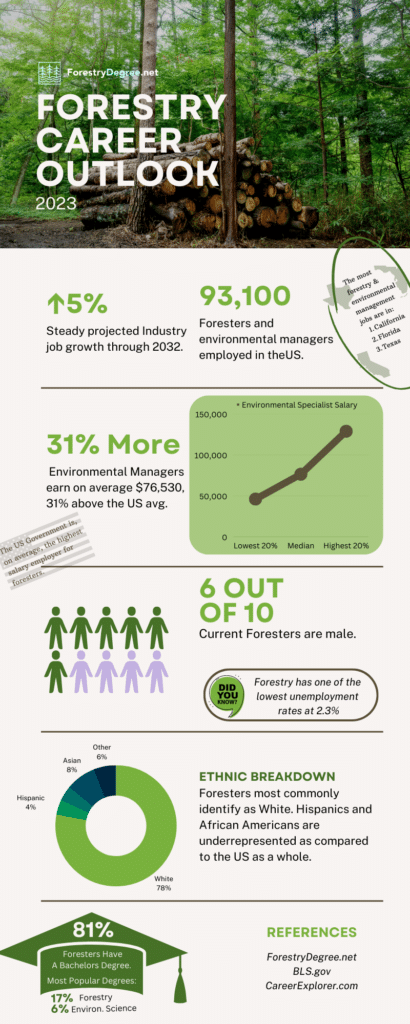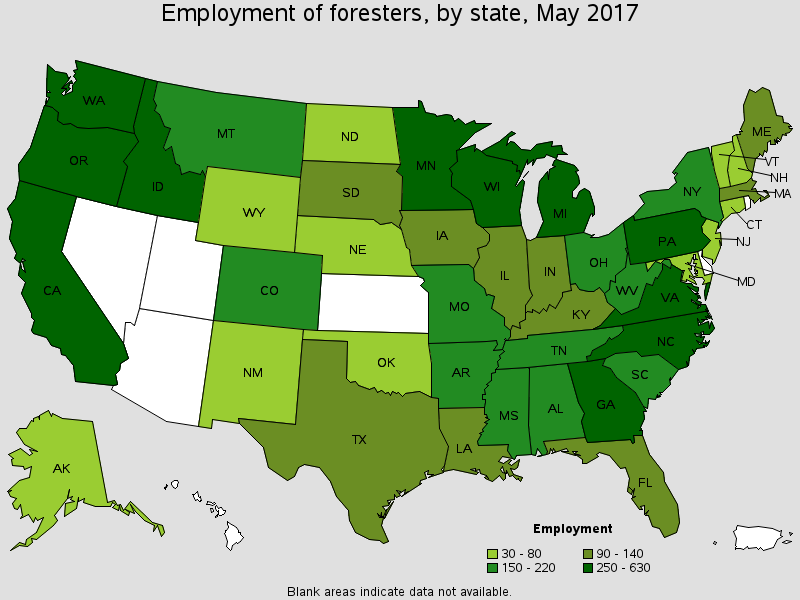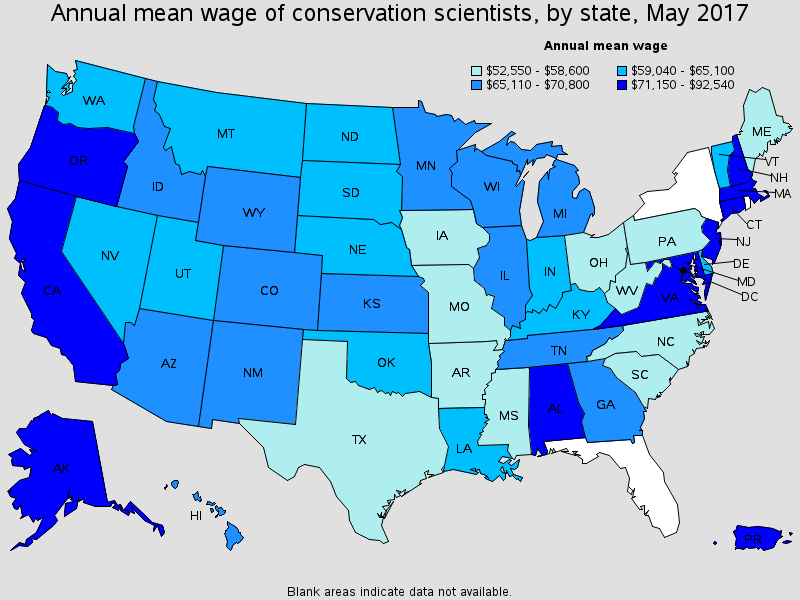
Forestry Careers
More Answers From Forestry Professionals
Did You Know?
Forestry and conservation jobs are expected to grow 5% by 2030, and retirements will create more career opportunities.
Career Overview
What Can You Do With A Forestry Degree?
Forestry and environmental management are broadly applicable degrees that enable you to enter a wide variety of careers. Here are a few of the more common forestry and environmental management careers:
- Forester: Manages forests and plans for their sustainable use, including harvesting, planting, and monitoring forests.
- Wildlife Biologist: Studies wildlife and their habitats, and works to protect and conserve species and their ecosystems.
- Silviculturist: Manages the growth and development of forests, and works to increase the quality and quantity of forest resources.
- Soil Scientist: Studies the properties and processes of soil, and works to manage soil resources for sustainable forestry practices.
- Arborist: Cares for trees, including planting, pruning, removing, and diagnosing diseases and pests.
- Conservation Biologist: Works to protect biodiversity and conserve natural resources, including forests and wildlife.
- Wildlife Manager: Manages and conserves wildlife populations, and implements programs for hunting, fishing, and other recreational activities.
- Environmental Educator: Teaches others about the importance of forests and the environment, and works to promote conservation and sustainability.
- Fire Management Specialist: Manages and responds to forest fires, and works to prevent and mitigate their impact on forests and wildlife.
- Forest Engineer: Designs and implements systems and structures for managing forests, including roads, bridges, and logging equipment.
- Geospatial Analyst: Uses geospatial technology, including GIS and remote sensing, to manage and analyze forest resources.
- Ecologist: Studies the relationships between organisms and their environment, and works to protect and conserve ecosystems, including forests.
- Land Use Planner: Works to balance the needs of forests and other natural resources with the needs of human populations, including urban and rural development.
- Conservation Scientist: A conservation scientist works to protect and conserve natural resources, including forests, wildlife, and ecosystems. They study the impact of human activities on the environment and develop strategies for sustainable resource management.
- Agricultural and Food Scientist: An agricultural and food scientist works to develop and improve methods for producing and processing food, fiber, and other agricultural products. They may also study the environmental impact of agricultural practices and work to develop sustainable methods.
- Firefighter: A firefighter responds to fires and other emergencies, working to extinguish fires, rescue people and animals, and protect property. They may also participate in fire prevention efforts, such as conducting public education and inspections.
- Forest and Conservation Worker: A forest and conservation worker performs manual labor tasks related to the management and conservation of forests, including planting, pruning, and removing trees, as well as fighting fires.
- Naturalist, Interpreter: A naturalist, interpreter works to connect people with nature, including parks, forests, and wildlife. They may lead interpretive hikes, give talks, or conduct educational programs about the environment and natural resources.
- Natural Resources Policy Representative: A natural resources policy representative works to shape public policy related to natural resources, including forests and wildlife. They may work for a government agency, advocacy organization, or private company to represent the interests of their clients in the policy-making process.
- Park and recreation management: Park and recreation management professionals plan, develop, and maintain parks, recreational areas, and cultural facilities. They work to balance the needs of park users with the need to protect and conserve natural resources.
- Environmental studies: Environmental studies is an interdisciplinary field that explores the relationships between humans and the environment, including the impacts of human activities on natural resources and the environment.
- Horticulture: Horticulture is the study and cultivation of plants, including fruits, vegetables, flowers, and ornamental plants. Horticulturists may work in a variety of settings, including greenhouses, nurseries, and gardens.
- Biological sciences: The biological sciences are a broad field that encompasses the study of living organisms, including their structure, function, evolution, and interactions with each other and the environment.
- Fisheries and wildlife law enforcement: Fisheries and wildlife law enforcement professionals enforce laws and regulations related to the management and conservation of wildlife and fish populations. They may investigate wildlife crimes, such as illegal hunting or fishing, and enforce regulations to protect wildlife and their habitats.
Foresters also frequently work for private consulting firms, or the timber industry. Many industries look to hire forestry majors to provide assistance and advice to landowners. With the knowledge and skills acquired in a forestry degree program, you’ll know how to integrate biological, economic, and political considerations into land management decisions.
Who Are The Largest Employers For Foresters?
State and federal governments have the highest levels of employment of foresters. This is due to the number of state and national parks that need park rangers to keep visitors safe. On average, the federal government offers the highest pay for foresters.
Industries with the highest levels of employment in this occupation are as follows (source: BLS.gov: Occupational Employment And Wages: Foresters, data for May 2017).
What Is The Employment Outlook For Foresters And Conservation Scientists?
When deciding on a degree and career path, it helps to know where to look for employment and what areas in your field are currently growing. The map below, provided by The Bureau of Labor Statistics (BLS), illustrates employment levels of foresters by state (source: BLS.gov: Occupational Employment And Wages: Foresters, data for May 2017).
According to The Bureau of Labor Statistics (BLS), employment of conservation scientists and foresters is projected to grow 5 percent from 2021 to 2031, similar to the average for all occupations. When combined with a rapidly aging existing workforce, this leads the Bureau of Labor and Statistics to predict continued demand for workers in forestry related fields through at least 2035.
The BLS also reports that most employment growth is expected to be in state and local government-owned forest lands, particularly in the western United States. In addition, continued demand for American timber and wood pellets is expected to drive employment growth for conservation scientists and foresters. And finally, BLS reports that due to an older workforce in the field, they expect higher than average rates of retirements within forestry and environmental management careers in the next few years.
The map to the left illustrates the employment of conservation scientists by state (source: BLS.gov: Occupational Employment And Wages: Conservation Scientists, data for 2017).
Degree Requirements
In most cases, a Bachelor of Science (BS) degree is required for entry-level positions in a forestry related career. For example, 81% of foresters report having a bachelors degree. There is wide variety in the specific bachelors degree that people in the field obtain, the two most common are forestry, and environmental science. Some leadership positions, however, do require a masters level degree.
Not all schools have a forestry program, but they may offer an environmental studies program or a wildlife / forestry conservation degree or other related degrees.
Experience And Credentials
Internships and networking are often paramount to employment in many fields, including forestry. Securing an internship while taking classes is a great way to network with forestry professionals while gaining experience in the field. You can find internship listings on general job sites or through your school’s career center. Your professors might also know of openings in your area. These opportunities are not always easy to come by, so you’ll need to be proactive in your search.
To give you an idea of what the U.S. Forest Service agency is looking for when sourcing talent, visit their career page to view open positions. You can also visit your state’s website to learn more about state parks, park districts, and other recreational and protected areas that often hire forestry professionals.
Professional Certifications
Although not required by most employers, there are several certifications that are recommended for individuals looking to work in forestry:
- Society of American Foresters (SAF) certification: The SAF offers the Certified Forester (CF) program, which is a professional certification program for foresters.
- Tree Care Industry Association (TCIA) certification: TCIA offers the Certified Arborist (CA) certification for individuals working in tree care.
- Association of Natural Resource Extension Professionals (ANREP) certification: ANREP offers the Certified Natural Resource Professional (CNRP) certification for individuals working in natural resource management.
- American Society of Consulting Arborists (ASCA) certification: ASCA offers the Board Certified Master Arborist (BCMA) certification for individuals working in arboriculture.
These optional certifications demonstrate an individual’s knowledge, skills, and experience in their field, and can help individuals advance in their forestry career.
Forestry Degree Types
To work in forestry, conservation or environmental management, you can choose from campus and online forestry degree programs at the associate, bachelors, masters and certificate levels, with the most common a bachelors degree. Regardless of degree level, coursework typically includes a mix of classes in biology, ecology, forest management, and environmental science. For detailed descriptions of common degrees in this field click the links below:
What Our Experts Say About Forestry Careers
I really like being able to work with my coworkers, but on larger incidents it’s just really neat to get a broader view of Forestry and Environmental Management and see how what we’re doing is contributing to the broader goal, which is managing the environment for resource and human and animal benefit.

I’ve always been an outdoorsy guy. I’ve always cared about the environment. I grew up hunting, fishing, hiking. I just love being outside. And I was always drawn to the idea of like, OK, can I get a job and a career where I can protect the things that I care about and enjoy every day?

[Environmental management] just encompasses so many different fields within it. You have the hard sciences, the bio, the ecology, but there’s also law, social justice, landscape architecture, education. If you love the environment … you will find something you can do in this field no matter what.













